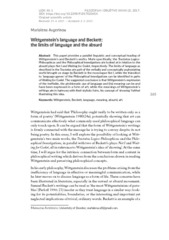Wittgenstein’s Language and Beckett : the Limits of Language and the Absurd
Апстракт
This paper provides a parallel linguistic and conceptual reading of Wittgenstein’s and Beckett’s works. More specifically, the Tractatus Logico-Philosophicus and the Philosophical Investigations are looked at in relation to the absurd plays Not I and Waiting for Godot, respectively. The limits of language as described in the Tractatus are part of theverbally and conceptually asphyxiating world brought on stage by Beckett in the monologue Not I, while the transition to ‘language games’ of the Philosophical Investigations can be identified in parts of Waiting for Godot. The suggested conclusion isthat Wittgenstein’s expression of the ineffable, the problematic use of language and (its) meaning can be and have been expressed in a form of art, while the meanings of Wittgenstein’s writings are in harmony with their stylistic form, his concept of ‘showing’ further illustrating this idea.
Кључне речи:
Wittgenstein, Ludwig / Beckett / language / meaning / absurd / art / Vitgenštajn, Ludvig / Beket / jezik / smisao / apsurd / umetnostИзвор:
Filozofija i društvo/Philosophy and Society, 2017, 28, 2, 365-376Издавач:
- Beograd : Institut za filozofiju i društvenu teoriju
Институција/група
IFDTTY - JOUR AU - Avgerinou, Marialena PY - 2017 UR - http://rifdt.instifdt.bg.ac.rs/123456789/1431 AB - This paper provides a parallel linguistic and conceptual reading of Wittgenstein’s and Beckett’s works. More specifically, the Tractatus Logico-Philosophicus and the Philosophical Investigations are looked at in relation to the absurd plays Not I and Waiting for Godot, respectively. The limits of language as described in the Tractatus are part of theverbally and conceptually asphyxiating world brought on stage by Beckett in the monologue Not I, while the transition to ‘language games’ of the Philosophical Investigations can be identified in parts of Waiting for Godot. The suggested conclusion isthat Wittgenstein’s expression of the ineffable, the problematic use of language and (its) meaning can be and have been expressed in a form of art, while the meanings of Wittgenstein’s writings are in harmony with their stylistic form, his concept of ‘showing’ further illustrating this idea. PB - Beograd : Institut za filozofiju i društvenu teoriju T2 - Filozofija i društvo/Philosophy and Society T1 - Wittgenstein’s Language and Beckett : the Limits of Language and the Absurd IS - 2 VL - 28 SP - 365 EP - 376 DO - 10.2298/FID1702365A ER -
@article{
author = "Avgerinou, Marialena",
year = "2017",
abstract = "This paper provides a parallel linguistic and conceptual reading of Wittgenstein’s and Beckett’s works. More specifically, the Tractatus Logico-Philosophicus and the Philosophical Investigations are looked at in relation to the absurd plays Not I and Waiting for Godot, respectively. The limits of language as described in the Tractatus are part of theverbally and conceptually asphyxiating world brought on stage by Beckett in the monologue Not I, while the transition to ‘language games’ of the Philosophical Investigations can be identified in parts of Waiting for Godot. The suggested conclusion isthat Wittgenstein’s expression of the ineffable, the problematic use of language and (its) meaning can be and have been expressed in a form of art, while the meanings of Wittgenstein’s writings are in harmony with their stylistic form, his concept of ‘showing’ further illustrating this idea.",
publisher = "Beograd : Institut za filozofiju i društvenu teoriju",
journal = "Filozofija i društvo/Philosophy and Society",
title = "Wittgenstein’s Language and Beckett : the Limits of Language and the Absurd",
number = "2",
volume = "28",
pages = "365-376",
doi = "10.2298/FID1702365A"
}
Avgerinou, M.. (2017). Wittgenstein’s Language and Beckett : the Limits of Language and the Absurd. in Filozofija i društvo/Philosophy and Society Beograd : Institut za filozofiju i društvenu teoriju., 28(2), 365-376. https://doi.org/10.2298/FID1702365A
Avgerinou M. Wittgenstein’s Language and Beckett : the Limits of Language and the Absurd. in Filozofija i društvo/Philosophy and Society. 2017;28(2):365-376. doi:10.2298/FID1702365A .
Avgerinou, Marialena, "Wittgenstein’s Language and Beckett : the Limits of Language and the Absurd" in Filozofija i društvo/Philosophy and Society, 28, no. 2 (2017):365-376, https://doi.org/10.2298/FID1702365A . .


